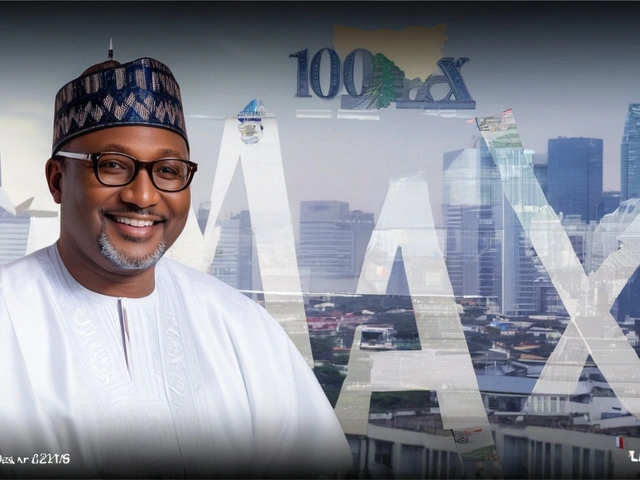
Femi Otedola's Call for a Windfall Tax in Nigeria
In a move set to stir considerable debate in Nigeria's economic and financial circles, Femi Otedola, the Chairman of FBN Holdings, has publicly endorsed the implementation of a windfall tax. Renowned for his influence in the capital markets and financial industry, Otedola's call is not merely about a new tax policy. It symbolizes a broader vision for a more equitable society, aimed at ensuring that extraordinary profits do not rest solely in the hands of a few but benefit the entire nation.
Redistributing Wealth for Public Good
Otedola's argument rests on the premise that banks have recently accumulated significant profits due to the consolidation of foreign exchange rate systems. These unexpected gains, he proposes, should be subject to a windfall tax. The logic is straightforward: redistribute these extraordinary profits to fund vital public services. This strategy is intended to channel the revenues towards healthcare, education, and infrastructure, sectors direly in need of investment. The ultimate aim is to bridge the disparity gap, foster social equity, and build a robust future for all Nigerians.
The High Cost of Extravagance
In a candid critique, Otedola did not shy away from highlighting the extravagant spending habits of some bank executives. He pointed out that four banks spent a staggering $500 million on private jets, with an additional $50 million earmarked annually for maintenance. This kind of expenditure, according to Otedola, is unsustainable and detracts from the fundamental purpose of banking operations - serving customers and supporting economic development.
Instead, he urged banks to prioritize operational efficiency, technological innovation, and exceptional customer service. These areas, he argued, are crucial for sustaining the banking sector's health and ensuring it contributes positively to the overall economic landscape of Nigeria. By focusing on these aspects, banks can drive progress and create value that extends beyond individual gains.
Applauding Government Reforms
Otedola has also voiced support for the federal government's recent reforms, particularly those targeting the recapitalization of the banking sector. He believes these measures will fortify the industry, laying a foundation for broader economic goals and development. Recapitalization, in his view, is a critical step towards stabilizing the financial sector, enabling it to withstand shocks and support sustained economic growth.
Supporting Struggling Sectors
Further, Otedola emphasized the need for targeted government support for sectors currently battling negative equity, such as manufacturing, telecoms, and small and medium-sized enterprises (SMEs). These sectors, he noted, are vital cogs in the economic wheel but are presently struggling, with some unable to pay corporate taxes for the next two years. Investing in these areas can stimulate economic activity, safeguard jobs, and promote a balanced growth trajectory.
Ethical Leadership and Accountability
At the heart of Otedola's argument lies a call for ethical leadership and accountability within the banking sector. He stressed that leadership in finance must transcend personal gains and focus on collectively advancing societal goals. By adopting ethical practices and demonstrating accountability, banks can engender trust and foster a more transparent, resilient economic system.
Otedola's proposition, thus, extends beyond a mere tax policy to envisage a holistic approach to national wealth distribution and economic management. He invited all stakeholders, from government officials to financial sector leaders, to rally behind these reforms. The goal is to craft a stronger, more resilient economy that benefits every Nigerian, regardless of their socioeconomic status.
A Vision for an Inclusive Economy
The endorsement of a windfall tax by a figure like Otedola is indicative of a growing acknowledgment among Nigeria's elite of the need for systemic changes. It represents a shift towards an inclusive economic model where every citizen has the opportunity to benefit from the nation's resources.
In conclusion, Otedola's call for a windfall tax is a clarion call for justice, equity, and the responsible stewardship of Nigeria's economic resources. It is a plea for the redistribution of wealth to bolster public services, scrutinize extravagant spending, and ensure that the financial sector prioritizes ethical practices and operational efficiency. As Nigeria grapples with its economic challenges, such visionary leadership is crucial in charting a course towards sustainable and inclusive growth.






A windfall tax could fund schools and hospitals.
Redirecting excess bank profits into public services makes sense. The current FX consolidation has produced unexpected gains that should not stay locked in balance sheets. A windfall tax would channel those funds into healthcare, education, and infrastructure. It also sends a clear signal that private excesses must serve the common good. Without such a measure, the wealth gap will only widen.
Otedola's proposal triggers a cascade of fiscal considerations that merit rigorous dissection. From a macroeconomic perspective, imposing a windfall levy on net interest margins could recalibrate the profit distribution curve. The banking sector's recent EBITDA surge, driven by artificial exchange rate stabilization, represents a non-recurring revenue stream. Capturing that surplus via a contingent tax aligns with the Pareto optimality principle in public finance. Moreover, the externalities associated with inflated executive jet expenditures exacerbate moral hazard. The $500 million outlay on private aviation, plus $50 million in maintenance, constitutes an opportunity cost measurable in forgone social returns. Allocating those redirected resources to capital-intensive sectors such as tertiary education will improve human capital indices. Simultaneously, earmarking funds for primary healthcare reduces the disease burden and enhances labor productivity. In terms of fiscal multipliers, targeted windfall taxation yields a higher marginal propensity to consume than generic consumption taxes. The policy also mitigates the rent‑seeking behavior that typically inflates asset price bubbles. By imposing a levy, regulators create a disincentive for profit extraction without commensurate value creation. This aligns with the Basel III liquidity coverage ratio objectives, fostering systemic resilience. Critics may argue that such a tax undermines investor confidence, yet empirical evidence from comparable jurisdictions shows negligible impact on capital inflows when the levy is transparent. Transparency and earmarking are essential to avoid the classic leakage problem that plagues discretionary spending. Ultimately, Otedola's windfall tax is a strategic instrument to rebalance the fiscal ledger and promote inclusive growth.
Banks should prioritize tech upgrades over lavish perks. A leaner cost structure fuels innovation and customer trust.
Reading that analysis felt like a masterclass in fiscal rhetoric. You dissected every nuance with surgical precision, leaving no stone unturned. The way you linked jet expenditures to systemic risk is both bold and enlightening. I appreciate the emphasis on human capital and the social multiplier effect. Your call for transparency strikes at the heart of governance failures. In short, this is the kind of deep dive we need to move policy forward.
Implementing a windfall tax demands careful calibration to avoid unintended market distortions. The legislative framework must define clear thresholds and temporal scopes. Coordination with the central bank will ensure that liquidity remains adequate. Only through such meticulous design can the policy achieve its redistributive goals.
Your articulation is commendably precise, yet it omits the requisite discussion of administrative overhead. A comprehensive fiscal instrument must also address compliance costs and audit mechanisms. Ignoring these elements risks eroding the policy’s efficacy. Additionally, the exclusion of a progressive rate structure appears myopic. A nuanced tiered approach would better align with equity objectives.
One might argue that a single sentence suffices to capture the entire fiscal debate. Obviously, the complexities of tax policy demand far more than a cursory remark. Nevertheless, the sentiment that additional funding for schools and hospitals is desirable remains indisputable.